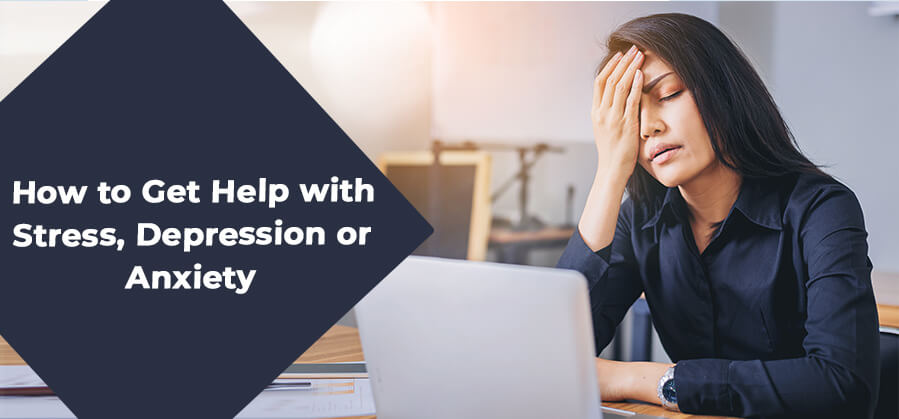

People living with anxiety, stress and depression experience terrifying mental and physical symptoms such as shortness of breath, unbearable headaches, and consistent rumination that make even the most straightforward work impossible. Also, people without anxiety who face the daily stress of a job or money can experience the same feelings and symptoms.
According to the data from the National Institute of Mental Health, nearly 19.1 per cent of Americans had an anxiety disorder. Also, the prevalence of anxiety was higher in females, i.e. 23.4 per cent as compared to males, i.e. 14.3 per cent. Furthermore, approximately 31.1 per cent of Americans experience an anxiety disorder in their life.
Depression, anxiety or stress affects differently to different persons and relationship. Those struggling with depression tend to aloof themselves and reject help. Therefore, it is quite essential to manage it in a helpful, compassionate, healthy and supportive way. You can take care of the depressed person with the help of useful tips, suggestions and working together, it can be managed easily.
However, there are various methods to manage stress or anxiety-related issues.
It is a fact that physical activity, like walking keeps a person more active and reduces stress. New research, published in the journal Psychology of Sports and Exercise demonstrated that mindful movement enhances a person’s wellbeing by reducing anxiety and stress. It was derived from the study that subjects who showed less stress while moving, received more benefits when they were more mindful.
As per the statics from the American College Health Association, more than 50 per cent of college-goers experience mental exhaustion, sadness and anxiety, minimum one time in a year. Thus, there is a need to lessen these negative feelings. As students move around the entire day, walking in and out of their classes and perform other physical activities, the scientists wanted to observe a link between movement, mindfulness, and dropping negative stress.
After examining the data, it was found that during the movement, subjects were more active and demonstrated a reduction in adverse effects. It was concluded that the combination of walking and being mindful is linked to lower stress levels.
Stress is rapidly becoming an epidemic and widespread issue. It has become a part of our daily activities and has reduced energy, zest, and vitality. However, mindfulness is a powerful tool for managing everyday stress. It helps to decrease the cortisol level in the body and eliminate resistance. It is not possible to reduce stress, but tackling stress through various coping strategies makes life easy. It is identifying the signs and symptoms of stress help to develop coping mechanisms and prevent to adopt unhealthy ways like smoking, drinking or taking drugs.
A person can seek professional advice from a qualified behavioural healthcare specialist to manage stress.
Seek the help of a behavioural health care specialist
Apart from following all these practices, even if one is not able to manage signs of anxiety or stress, talk to a qualified therapist. It will prevent a person from becoming more anxious and developing coping mechanisms to manage stress. It helps to break unhealthy patterns like taking alcohol or drugs and inspire to lead a healthy life. Experiencing anxiety is not under one’s control, but taking proper care of one’s physical and mental health is a must. Adopting a healthy diet, doing adequate exercise and sleeping 6-8 hours help to recover fast.
Coping techniques with PTSD symptoms
The signs of PTSD are although challenging to cope with, but many people with PTSD, get addicted to alcohol or drugs. Many healthy coping strategies can be incorporated to manage unpleasant memories and thoughts, insomnia, dissociation, flashbacks, and anxiety. The therapist can recommend exposure therapy that reduces anxiety and fear. Moreover, cognitive behavioural therapy focuses on changing negative thoughts and feelings to positive.
Seeking the right treatment.
Every person responds in a different way to traumatic experiences. However, the emotion and feelings of sadness, fear, grief, and anger are natural human reactions to any traumatic event. But if these feelings of anguish and fear remain for a more extended period, then they need to be appropriately addressed. Therefore, getting proper and timely treatment can prevent an average stress level from getting developed into PTSD. It feels incredibly tough to witness the feeling of helplessness when any of the partners is battling with depression.
The signs of depression can make one’s partner feel burdensome and distant. It also causes frustration and upset everyone.
Seek treatment for depression
Motivate your partner to seek treatment by going with him to a behavioural health care specialist. The therapist gives a customized treatment plan, including psychological treatment as well as medicines. Psychological therapies help to change negative thinking and provide coping skills to deal with daily stress. Therapies can be cognitive behavioural therapy, interpersonal therapy, behaviour therapy and counselling. Medicines are useful to treat moderate to severe depression.
Teenagers with anxiety lack confidence in themselves and can easily get overwhelmed. If anxiety is hindering the way of kids to lead a healthy life, then seek support from a trained therapist. They can learn problem-solving and coping skills to manage the signs of anxiety. Anxiety can be handled easily with the support of family members, teachers and friends. Identifying the symptoms of anxiety and seeking professional help prevents the child from suicidal ideation and attempts.